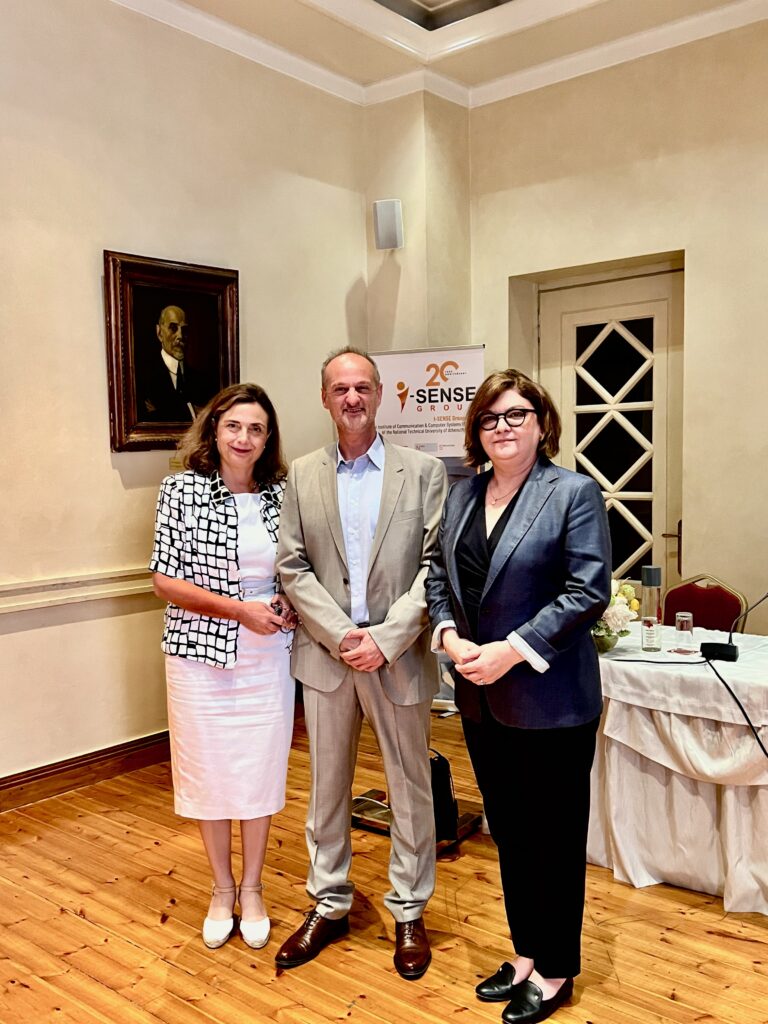The European Commissioner for Transport, Adina Vălean, led a constructive citizens’ dialogue in Athens under the title ‘European Transport on Track for a Sustainable and Green Future’. The event was organized by the Representation of the European Commission in Greece and the Institute of Communication and Computer Systems (ICCS) of the National Technical University of Athens (NTUA) and succeeded in creating a valuable field for interaction between EU policy-making and representatives of the Greek youth.
The event was held in the frame of the Commissioner’s visit to Athens and on the occasion of the 2022 European Year of Youth, as an activity that puts a spotlight on young Europeans giving them the opportunity to share their vision from a post-pandemic perspective, to listen and be heard and to engage in the process of building a better future for transport– greener, smarter, more inclusive and digital.![]()
“You proposed the title ‘European Transport on Track for a Sustainable and Green Future’ for our discussion. And I believe we are on track, even though there are not easy times for our transport system. Both the COVID pandemic and Russia’s war against Ukraine brought disruptions in our logistics chains that we previously took for granted. But these new challenges come on top of what is perhaps THE challenge of our generations – yours and mine – and that is cutting greenhouse gas emissions to tackle climate change” said the Commissioner.
Dr Angelos Amditis, Chairman of ERTICO- ITS Europe and R&D Director of ICCS/NTUA welcomed the Commissioner and stressed the importance of the transport sector as a cornerstone not only for the European economy but also for the Greek economy and development. He highlighted the crucial role that smart mobility plays in the EU’s energy and climate objectives. ‘As our society becomes more mobile, EU transport policy will provide the answers that will help us overcome the current challenges and will show us the way to achieve environmental sustainability, economic efficiency, and resilience for our societies’. Pointing out to a sector that is in a constant transformation, highly challenged by broad processes, current geopolitical and energy crises and increasingly shaped by disruptive technologies (such as the Internet of Mobility, Connected, Cooperative and Automated Mobility(CCAM), MaaS), he stressed the role of policy and research in achieving a better future and the role of coordination in an increasingly multidimensional mobility ecosystem.

From left to right: Mrs Niovi Ringou, Dr Angelos Amditis, Mrs Adina Vălean.
‘By investing in innovative, smart and sustainable technologies, we will be preparing our transport network for the future. By leading the way on green and digital transport solutions, we will ensure that our transport operators remain competitive on the global stage. And we will also strengthen resilience within our transport system. In short, we need to invest now to put our transport system in the best possible position tomorrow. To do so, we also need young people as your University’s students, with new ideas and energy, to consider the transport sector as a future career path’ the Commissioner noted.
The meeting attracted a great number of participants, with attendance of a diverse young audience, a blend of students, researchers, start-up representatives, and members of European youth organizations and hubs, and succeeded in engaging them in a fruitful dialogue that provided insights into their priorities and considerations in designing a green future for transport.
The discussion highlighted vital aspects of the Greek experience in the field of transport, pointed to the need for optimized infrastructures and regional planning in Greece and introduced the audience to an array of EU planning tools (legislation, capacity-building activities, training, institutional support, data management, mechanisms for cooperation, directives) available for supporting the national authorities in strategically pursuing their green targets.
The details of our transition to EVs as well as the prospects and challenges of hydrogen use as a source of clean energy, which can combat global climate change and poor air quality, came up in the discussion several times. The focus was given to the priorities and challenges of the EU energy transition, a process which is highly shaped and accelerated by current geopolitical circumstances, Europe’s external and jeopardized relations and a process that is highly dependent on each member state’s strategies and plans. Different socioeconomic structures and the energy mix across Europe have caused the implementation process of each EU target to develop at a different pace among European countries, the Commissioner noted.
Efforts for eliminating the distance between the policymakers and the citizens, opportunities for youth involvement in the policy-making domain, as well as issues related to data sharing in a multidimensional mobility ecosystem were also discussed.
As a closing remark, Mrs Niovi Ringou, Head of the European Commission Representation in Greece, stressed the importance of including the youth’s priorities and viewpoints at every level of the EU’s decision-making process and delivering a sustainable future for the next generations.
Source: ICCS
